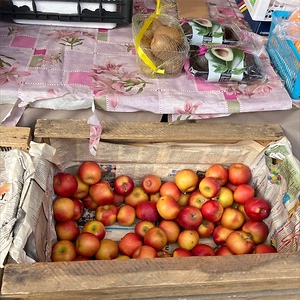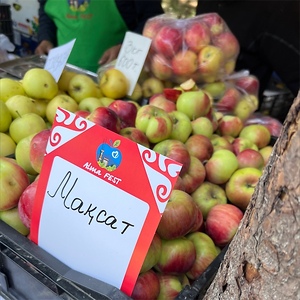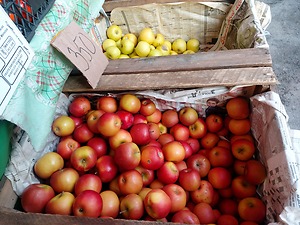


Maksat Apples
Estimated Inventory, lb : 0
Description/Taste
Maksat apples are large fruits that have a conic, ovate, to round shape with a slightly lopsided appearance. The skin is smooth, firm, glossy, and has a yellow-green base, which is almost entirely covered in dark red blush and prominent white lenticels. Underneath the surface, the flesh is crisp, dense, aqueous, and pale green to white, encasing a central core filled with a few small, black-brown seeds. Maksat apples are known for their aromatic, honeyed fragrance and have a balanced, sweet and sour flavor.
Seasons/Availability
Maksat apples are harvested in the fall and can be kept in cold storage until the early spring.
Current Facts
Maksat apples, botanically classified as Malus domestica, are an autumn variety that belongs to the Rosaceae family. The apples were developed in Almaty, Kazakhstan, and the name Maksat roughly translates from Kazakh to mean “aim” or “purpose.” Maksat apples were selected at the Kazakh Research Institute of Fruit Growing and Viticulture for their resistance to disease, high yields, and robust, balanced flavor. The apples are primarily considered a local variety grown by small farms in Kazakhstan and are commonly sold at fresh markets. Maksat apples are a specialty fruit favored for their sweet, aromatic fragrance and are popularly eaten fresh, out-of-hand as a dessert variety.
Nutritional Value
Maksat apples are a good source of vitamin C, which is an antioxidant that can help protect the body from free radical damage, increase collagen production, and boost the immune system. The apples also contain fiber, which is a nutrient that improves digestion, and provide some vitamin A, potassium, calcium, and phosphorus.
Applications
Maksat apples are best suited for raw applications as their aromatic, sweet, and tangy flesh is showcased when consumed fresh. The crisp flesh can be sliced and eaten as is, sliced and served with dips, spreads, cheeses, and nut butter, or chopped and tossed into green and fruit salads. Maksat apples can also be pressed into juices and ciders, cooked into preserves, jams, and jellies, or thinly sliced and dried for extended use. Once dried, the slices can be reconstituted into a compote, chopped finely and added to roasted meats and rice, or consumed as a chewy snack throughout the winter season. Maksat apples pair well with herbs such as mint, thyme, basil, and parsley, potatoes, beets, carrots, and meats such as poultry, beef, lamb, pork, and fish. The fresh fruits will keep 2-4 months when stored in a cool, dry, and dark place.
Ethnic/Cultural Info
Kazakhstan is known for its apple diversity and is also believed by many experts to be the center of origin for apples, but only thirty percent of apple sales in the country stem from domestically produced fruits. This surprisingly low number is attributed to the fact that small farms produce the majority of domestic apples throughout the regions of Turkestan, Almaty, and Zhambyl. Many of these farms rely on ancient cultivation practices and handpicking versus industrial equipment to complete the harvest process. These farms also do not have large cold storage facilities to store the fruits for an extended amount of time, making it difficult to compete over multiple seasons. Due to the lack of a domestic agricultural infrastructure to support the market demand, approximately 150 thousand tons of apples are imported from Uzbekistan, Poland, Kyrgyzstan, and China. Multiple studies have been conducted to help build an infrastructure to support more domestic sales, but despite the overwhelming amount of imported varieties, many Kazakh locals have recently been returning to local varieties in search of better quality and flavor. One example is the search for the new Maksat variety. Maksat apples can be purchased from a local Kazakh farmer, known as Dimitri, who is one of the few ethnic Russians left in Kazakhstan after the collapse of the USSR. Dimitri owns apple orchards in the foothills of the Ile Alatau mountains near the town of Talgar in the region of Almaty and has been involved in apple cultivation since he was a child. Today he sells his apples through weekend food markets and will negotiate prices for the local varieties to try to set a reasonable price for the quality fruits.
Geography/History
Maksat apples were developed at the Kazakh Research Institute of Fruit Growing and Viticulture in the region of Almaty, Kazakhstan. Believed to be a natural selection of the prima apple variety, Maksat apples were officially listed in 2011 in the Kazakh state register for approved cultivation. Today Maksat apples are primarily localized to Kazakhstan and are grown throughout the Zhambyl and Almaty regions. The apples featured in the photograph above were found at a weekend food fair in Almaty.










